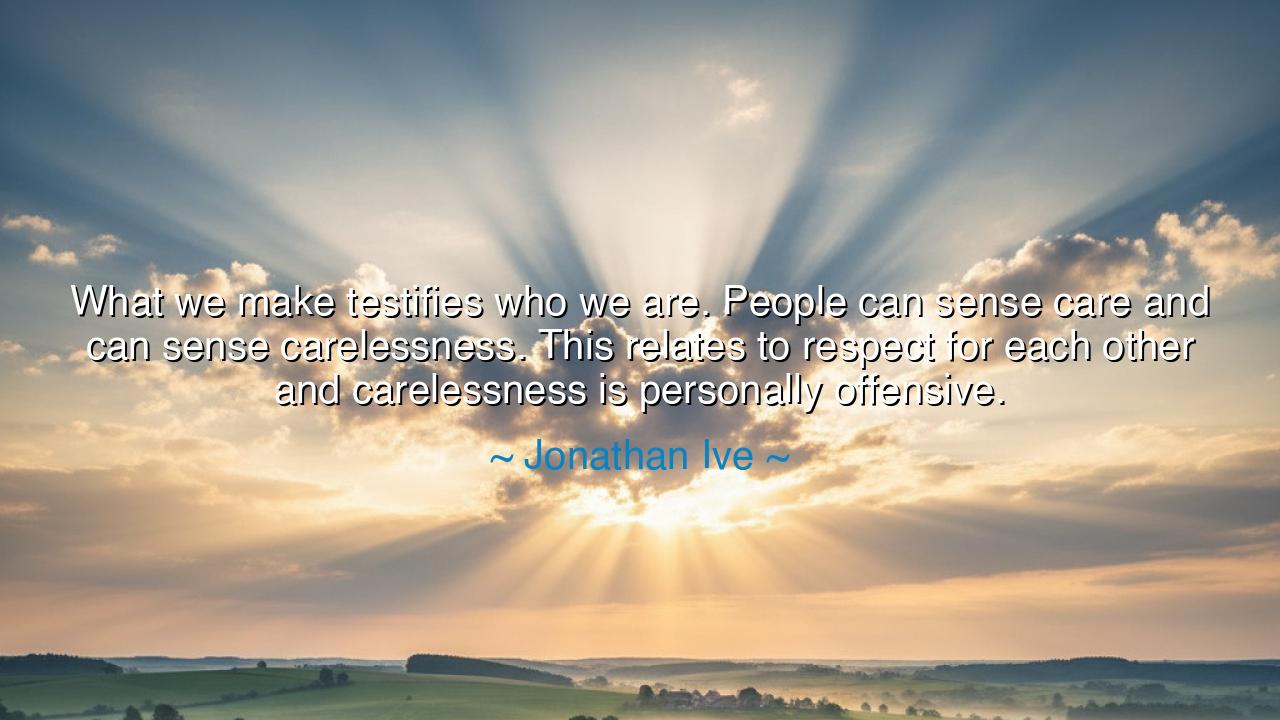
What we make testifies who we are. People can sense care and can
What we make testifies who we are. People can sense care and can sense carelessness. This relates to respect for each other and carelessness is personally offensive.






Hear now the words of Jonathan Ive: “What we make testifies who we are. People can sense care and can sense carelessness. This relates to respect for each other and carelessness is personally offensive.” These words stand like a chisel carved into stone, teaching us that creation is not neutral, but moral; not merely the shaping of matter, but the revelation of the maker’s soul. Every object we fashion, every work we send into the world, whispers the truth of our heart. The diligent hand speaks of love; the careless hand betrays neglect.
For from the dawn of time, the ancients knew this: the potter’s vessel carried the spirit of the craftsman; the builder’s temple reflected the devotion of its architects. If the work was done with reverence, it ennobled all who beheld it. If it was wrought with haste or indifference, it dishonored both maker and receiver. Ive’s words remind us that care is not a detail but a sacred duty, a way of saying to another soul, “You are worthy of my finest effort.”
Consider the Parthenon of Athens, which still rises in ruined majesty. Each column was measured with precision, each stone hewn not only for strength but for beauty. The builders could have chosen shortcuts, knowing time would erode their labor. Yet they pursued perfection, believing that even the gods must feel honored by such devotion. Their care testifies across millennia, and their work proclaims who they were: a people who held beauty and reverence as divine obligations.
Now imagine the opposite: a bridge built with negligence, collapsing under the weight of those who trusted it. Such carelessness is more than error; it is an insult to the lives endangered, an act of disregard for human dignity. Ive speaks rightly: carelessness is personally offensive, for it tells the receiver, “You are not worth the trouble, you are not worth the time.” To create without care is to wound the invisible bond of respect that ties maker to user, neighbor to neighbor, soul to soul.
This teaching does not dwell only in temples or machines; it lives in the smallest gestures. A handwritten letter carefully folded, a meal prepared with thought, a room kept clean—all these are silent proclamations of respect. They declare, “I see you, and I honor you.” But when one slaps together a thing with indifference, it conveys the opposite: contempt. Thus even the humble crafts of life become moral acts, either uplifting or demeaning those who encounter them.
The lesson is clear: treat every work, no matter how small, as a reflection of yourself. If you sweep the floor, sweep it as though the world is watching. If you design a tool, shape it as though it will speak for you after you are gone—for indeed it will. What we make testifies who we are. Our works are our monuments, our witnesses, our messengers to the future. Therefore, let every creation bear the mark of dignity, so that those who come after us may say, “Here was one who cared.”
What practical steps, then, shall we take? Let us slow our hands, banish haste, and approach each task with reverence. Let us measure twice before we cut once, let us polish the hidden corner though no one will see it, let us give the fullness of our attention even to the smallest work. In doing so, we practice not only craftsmanship, but also the art of honoring life itself. For in every act of care, we shape a world where respect becomes tangible, visible, and unforgettable.
Therefore, remember: your works are not just objects, but echoes of your soul. They travel farther than your voice, endure longer than your breath, and testify louder than your boasts. So let them speak nobly. Let them proclaim to generations unborn that you lived with care, with respect, and with reverence for all who would one day hold in their hands the fruit of your labor. In this way, your life becomes more than survival—it becomes a legacy of honor.






AAdministratorAdministrator
Welcome, honored guests. Please leave a comment, we will respond soon